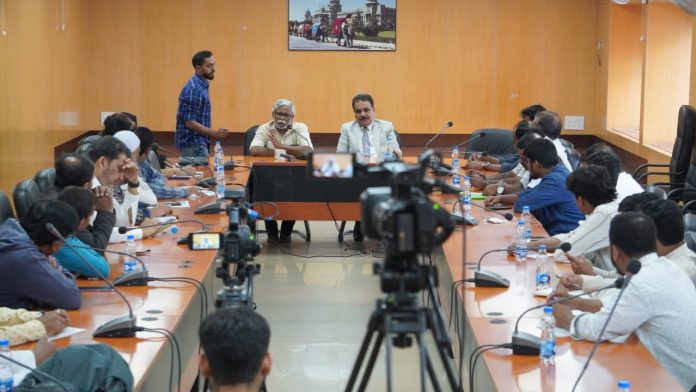– Mohammed Talha Siddi Bapa
Bengaluru: In a significant move reflecting the growing demand for equitable development and social justice, the Solidarity Youth Movement Karnataka convened a high-level consultative meeting here to discuss the upcoming Karnataka Social, Educational, and Economic Survey 2025. Held at the Legislators’ Home, the event brought together prominent intellectuals, community leaders, retired bureaucrats, and civil society representatives, signalling the crucial role this data-driven initiative is expected to play in shaping inclusive policy.
The survey, proposed by the Karnataka state government, aims to capture the ground realities of various communities, particularly focusing on social, educational, and economic indicators. The discussion centred around ensuring grassroots participation and outlining the responsibilities necessary to make the process transparent, representative, and impactful.
This programme, organised by Solidarity Youth Movement Karnataka, a Muslim youth organisation, was particularly aimed at educating the Muslim community about the concept and constitutional importance of reservations. It sought to raise awareness about which sections of the Muslim community qualify as backward classes and are therefore eligible for reservations under social justice provisions.
Delivering the keynote address, noted social thinker Shiv Sundar provided historical context by tracing the trajectory of caste enumeration during British India and the erstwhile Mysore State. He highlighted how caste-based data and proportional representation formed the basis of early affirmative action policies, including those recommended by the Mandal Commission.
Citing contemporary examples, he drew attention to how Bihar and Telangana have already conducted similar scientific surveys and are now using the data to implement more equitable welfare delivery models.
“India cannot truly progress while a significant section of its population remains burdened by the weight of historical injustices,” observed one speaker.
“The caste system — particularly in its most oppressive forms, such as untouchability and entrenched upper-caste dominance — remains a deep-rooted barrier to the nation’s full development. Dismantling this barrier demands more than just intent; it requires credible data, firm political will, and an unwavering moral commitment to equality.”
Participants in the discussion noted that a similar attempt was made in 2015 by the Kantharaj Commission, which conducted a detailed caste-based survey. However, delays in report submission and lack of political will rendered it ineffective. The renewed attempt, now under the Social, Educational, and Economic Survey 2025, is seen as a historic opportunity to correct the course.
Bridging Centuries of Discrimination
Several speakers stressed the constitutional vision of social justice, which remains elusive for vast sections of India’s population. In this context, reservations in education, employment, and political representation, as envisioned by Dr. B.R. Ambedkar, were seen not merely as welfare provisions but as instruments of corrective justice — tools to redress centuries of caste-based exploitation and systemic exclusion.
The participants strongly emphasised that the upcoming survey should aim to accurately assess the backwardness of each community on measurable social, educational, and economic parameters. Only then can policies be designed to empower the marginalised through targeted interventions.
A Collective Responsibility
The event was marked by the presence of prominent Muslim organisations and personalities, including the State President of Jamiat Ulama-i-Hind, representatives from the Muslim United Front, retired judges, IAS officers, and representatives from various social and religious organisations. Their participation signalled the importance of ensuring that minority voices are included and heard in the discourse around justice and representation.
In his introductory remarks, Ismail Teerthahalli, State Secretary of Solidarity Youth Movement, underlined the need for community awareness and engagement with the survey process. Yaseen Kodibengre, a member of the State Advisory Committee, moderated the session with insights into legal and procedural frameworks.
Dr. Naseem Ahmed, State President of Solidarity Youth Movement Karnataka, delivered the concluding remarks, laying out a future roadmap for advocacy, community mobilization, and cooperation with government institutions to ensure the survey’s successful execution.
Notable Attendees
Distinguished participants at the event included retired IAS officer Ibrahim Adoor, N.T. Abru, C.M. Faiz, M.A. Siraj, Mujibullah Zafari, Zubeda Begum, Abdussalam Puttige, Syed Iqbal, KPCC member Mustafa Hussein, Dada Peer, Muhammad Peer Latgeri, and Afwan Hoode, among many others. Their contributions added weight and direction to the discussion.
Editorial Perspective
The Karnataka Social, Educational, and Economic Survey 2025 is not merely a statistical exercise; it is a political and moral imperative. As India stares into a future shaped by data and digital governance, failing to recognise and rectify structural inequalities will only deepen the fault lines. This survey, if conducted with integrity and seriousness, could be a turning point in Karnataka’s journey toward justice, equity, and dignity for all.
In the words of Ambedkar, “Justice is another name for liberty, equality, and fraternity.” Let this survey be a step toward actualising that vision in the lives of those who have been left behind for far too long.
Towards Justice Through Data: Karnataka’s New Survey Aims to Unshackle Marginalised Communities
RELATED ARTICLES




